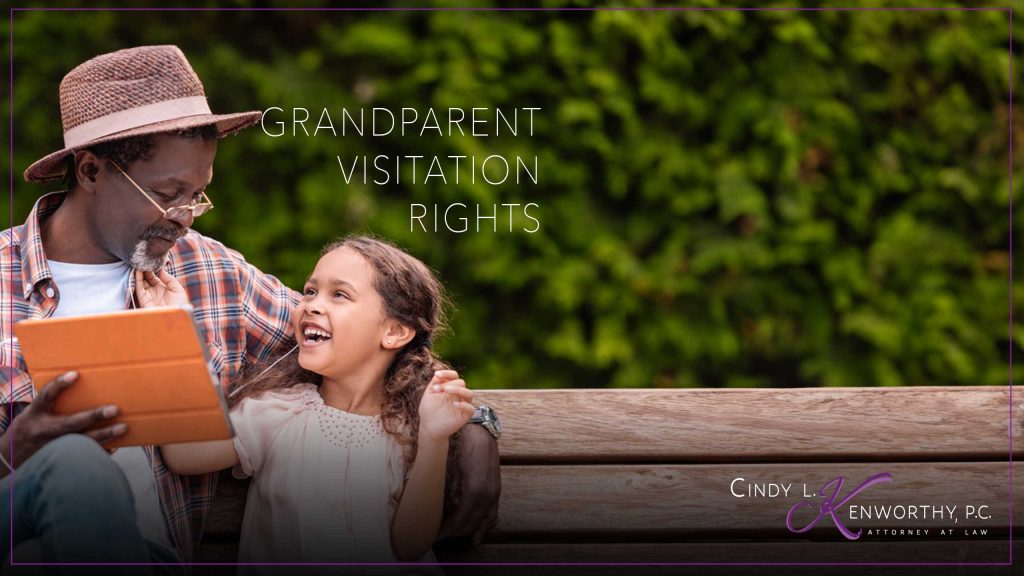Grandparent Visitation Rights
Are you wondering whether you or someone you know may have grandparent visitation rights in Indiana? While visitation is not guaranteed, grandparents do have visitation rights in certain circumstances.
On this page, we’ll answer common questions about visiting rights for grandparents in Indiana and how you can pursue visitation if you’re eligible. Every situation is unique, so please contact us at 317-516-0515 today for a compassionate conversation about grandparent visitation.
Do Grandparents Have Visitation Rights in Indiana?
Grandparents have rights in Indiana, but a child’s parents also have the legal right to care for their children and make decisions for them with minimal interference from grandparents. Unless the court determines there is a valid reason to do so, grandparents’ rights usually do not override parents’ rights.
Under Indiana code IC 31-17-5, also known as the Indiana Grandparent Visitation Act, grandparents may seek visitation with a grandchild if the child’s parent is deceased, the child’s parents are divorced, or in the case of a child born out of wedlock, paternity has been established. Paternity is established through an affidavit filed with the Department of Health or by court order.
 A court may not issue an order for grandparent visitation if the child’s biological parents are married to each other. If they marry after a grandparent visitation order is issued, that order may be voided.
A court may not issue an order for grandparent visitation if the child’s biological parents are married to each other. If they marry after a grandparent visitation order is issued, that order may be voided.
When there is a question of paternity, the child’s paternity should be established before a petition for grandparent visitation is filed. However, under IC 31-17-5-8, after grandparent visitation is already established, grandparent visitation rights usually survive the establishment of paternity.
An existing grandparent visitation order may or may not survive a child’s adoption. When a child is adopted by a step-parent or biological relative, the court may review grandparent visitation and determine what type of visitation, if any, arrangement would be best for the child.
When a child’s parents’ marriage was dissolved in another state and not Indiana, IC 31-17-5-10 applies. This means a paternal or maternal grandparent may seek grandparent rights if the custody order doesn’t otherwise prohibit it and an Indiana court may grant grandparent visitation rights under a modification order.
Broadly speaking, a court will only order grandparent visitation if that visitation will be in the child’s best interests. In determining the best interests of a child, the court must consider numerous factors including the meaningful contact between grandparent and child or the efforts made by the grandparent to visit with the child.
How Does the Court Decide to Grant Grandparent Visitation?
A grandparent who believes they may have standing to request grandparent visitation should follow the legal process to establish it. When doing so, care must be taken to ensure the action is filed in the correct jurisdiction.
 An action to establish grandparent visitation must be filed in a circuit, superior, or probate court in the county where the child resides or the court in which the marriage of the child’s parents was dissolved or paternity established. After the petition seeking grandparent visitation is filed with a court, the petition and a summons must be served on the custodial and noncustodial parents or the child’s legal guardian.
An action to establish grandparent visitation must be filed in a circuit, superior, or probate court in the county where the child resides or the court in which the marriage of the child’s parents was dissolved or paternity established. After the petition seeking grandparent visitation is filed with a court, the petition and a summons must be served on the custodial and noncustodial parents or the child’s legal guardian.
The court will hold a hearing to determine whether grandparent visitation will be in the child’s best interests. Grandparents may be asked to provide evidence of their previous time spent with the child, whether the child’s parents have interfered with their ability to spend time with the child, the safe living conditions of the grandparent’s home, and so forth.
Work with your family law attorney to gather proper documentation and interact with the court as instructed. Ultimately, it is the court’s decision whether to allow grandparent visitation or not, but your chances of obtaining visitation are better when you work with the court in good faith, follow the proper procedures, and show you have a genuine interest in doing what’s best for your grandchild.
When Would a Grandparent Petition the Court for Visitation?
Grandparents who feel a strong bond with their grandchildren might petition the court for visitation rights when something is changing in the child’s life and they are not allowed by the parent to see their grandchild. As a grandparent, you may fear that you will no longer have informal visitation time for some reason moving forward, so you’d like an order allowing you time with your grandchild.
Common situations include the parents’ divorce, legal separation, the child’s adoption, or a question of paternity that could place the grandparent’s connection to the child in jeopardy. Grandparents’ visitation is not generally granted unless there is a pressing reason to do so, it is in the child’s best interest; and it may be denied, which is described in more detail below.
Why Would Grandparent Visitation Be Denied in Indiana?
 Although it’s frustrating, you won’t be awarded grandparent visitation merely because you desire to have a strong connection with your grandchild. Even a long history of visiting with your grandchild doesn’t guarantee that the court will grant you grandparent visitation.
Although it’s frustrating, you won’t be awarded grandparent visitation merely because you desire to have a strong connection with your grandchild. Even a long history of visiting with your grandchild doesn’t guarantee that the court will grant you grandparent visitation.
In some situations, the courts deny a petition for visitation for various reasons.
Here are some of the most common reasons why grandparent visitation might be denied:
- There is a concern about the safety of the grandparent’s home or lifestyle.
- The child’s father has not established paternity of the child.
- Previously unmarried parents are now married, so the grandparent visitation order does not survive.
- Someone with standing opposes the grandparent visitation petition and the court agrees with the opposition.
- The petitioning grandparent has not supplied adequate evidence at the hearing.
Work with a family law attorney to understand your options and ensure your petition for grandparent visitation is complete, accurate, and has the best possible chance of court approval.
What Is the Difference Between Grandparent Visitation and Parenting Time?
Unless there is a court order to the contrary, parenting time, at a minimum, follows Indiana Parenting Time Guidelines to establish periods of time each parent may spend with a child based on the best interests of the child. A parenting time schedule is typically established after a divorce, during the pendency of a case and either changed or kept the same in the final order, or when a child’s parents have never been married.
By contrast, grandparent time is considered visitation time, not parenting time. Grandparent visitation time is carved out of the parent’s schedule according to either an agreed upon arrangement approved by the court or a court order.
Can Grandparents Sue for Visitation Rights?
 As an Indiana grandparent, you may seek visitation if a child’s parents are divorced, after a parent’s death, or when the parents were never married and you want to request visitation time. Many grandparents have an increased interest in taking legal steps to establish visitation when the child’s parents are divorcing and the future feels uncertain.
As an Indiana grandparent, you may seek visitation if a child’s parents are divorced, after a parent’s death, or when the parents were never married and you want to request visitation time. Many grandparents have an increased interest in taking legal steps to establish visitation when the child’s parents are divorcing and the future feels uncertain.
Through the courts, you may be able to set up a schedule to see your grandchild or grandchildren regularly, as long as visitation would be in their best interests and the arrangement meets other stipulations set by the court.
If you would like to pursue an action to acquire custody of your grandchild, rather than just establishing visitation, please review the information below about grandparent custody in Indiana.
Can Grandparents Get Custody of Their Grandchildren?
 Child custody refers to who a minor child lives with and who may make major decisions for a minor child. Custody typically falls to married parents, divorced parents, or parents who have never been married when paternity has been established.
Child custody refers to who a minor child lives with and who may make major decisions for a minor child. Custody typically falls to married parents, divorced parents, or parents who have never been married when paternity has been established.
In some circumstances, grandparents may gain legal custody of grandchildren who live with them. Grandparents with custody can make major life decisions for these minor children. Custody is decided by the courts and grandparents do not automatically receive custody when one or both parents are unable or unwilling to care for the children.
Nationwide, about 10% of children under the age of two live with their grandparents, and, in total, about six million U.S. children live full-time with their grandparents. The percentage of grandparents helping raise grandchildren in their homes rose from 3.6% in 2000 to 3.8% in the most recent U.S. Census figures. Not all of these grandparents have legal custody, but they still have a major impact on their grandchildren’s lives.
According to the State of Indiana Grandparent Rights FAQ, the state views grandparents as often playing a key role as relative caregivers, foster parents, and adoptive parents. Grandparents may be involved in Department of Child Services Child and Family Team Meetings and aid children during these proceedings.
How Can a Family Law Attorney Help?
A family law attorney can help you understand whether you have standing to pursue grandparent visitation or custody and how to help the process go smoothly. They will have seen other cases similar to yours and know what the courts expect from grandparents who are requesting legal arrangements regarding their grandchildren.
Overall, a family lawyer can help grandparents with:
- Seeking grandparent visitation or custody.
- Understanding parenting schedules, visitation schedules, and child custody agreements and orders.
- Enforcement of visitation time orders.
- Requesting action from the court, including visitation order modification.

Visiting Rights for Grandparents – Contact Cindy L. Kenworthy, P.C.
When you choose to work with Cindy L. Kenworthy, P.C. for grandparent visitation, you gain the benefit of almost 40 years of family law experience. We approach every case with tact, discretion, trust, and determination to find solutions for you.
We will support you, help you understand your rights as a grandparent, and allow you to feel confident and informed when you make decisions about how to move forward. Cindy L. Kenworthy, P.C. offers the experience and compassion grandparents need to stay connected with their grandchildren.
To learn more about grandparent visitation rights, contact us today at 317-516-0515.

